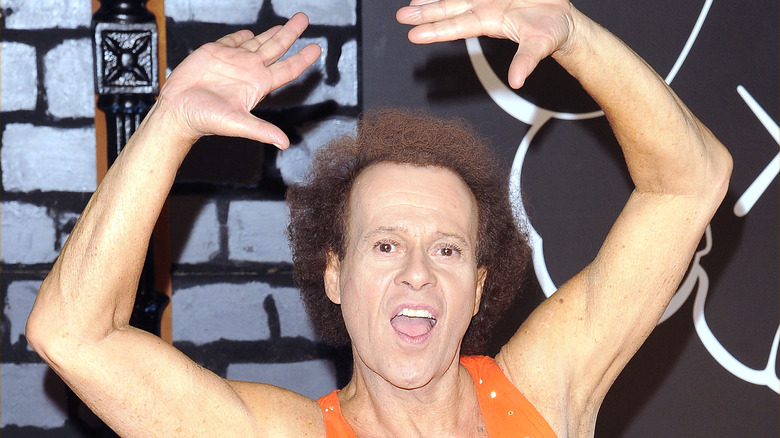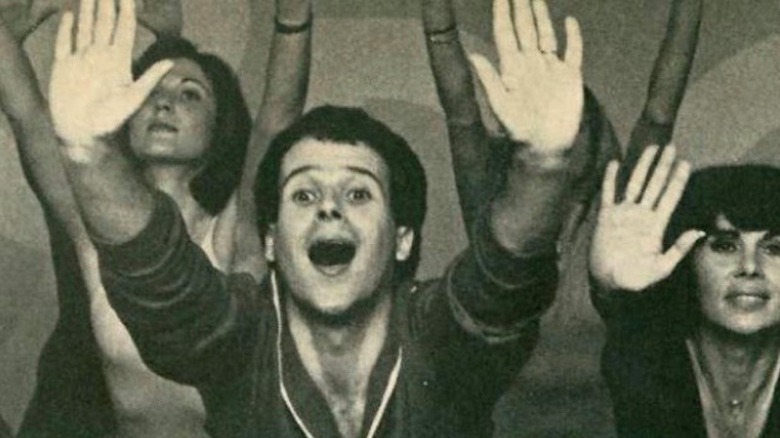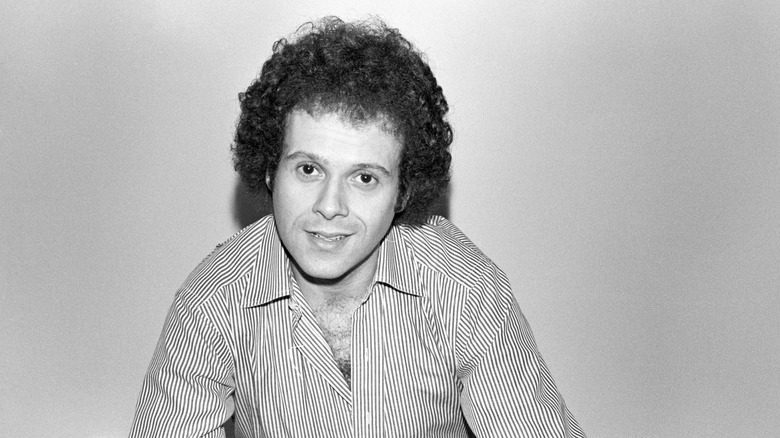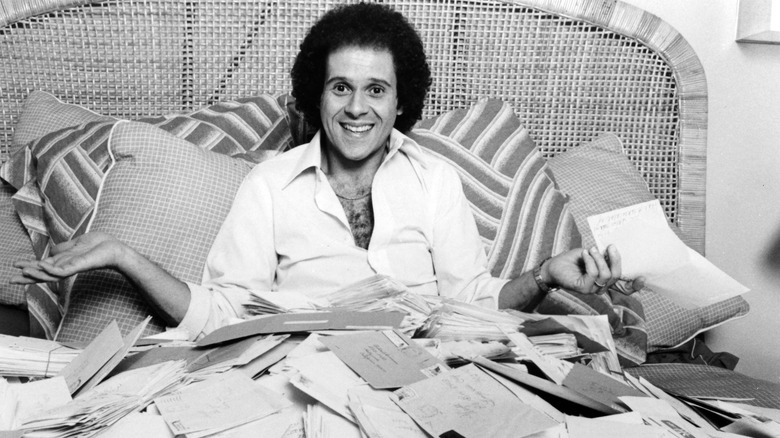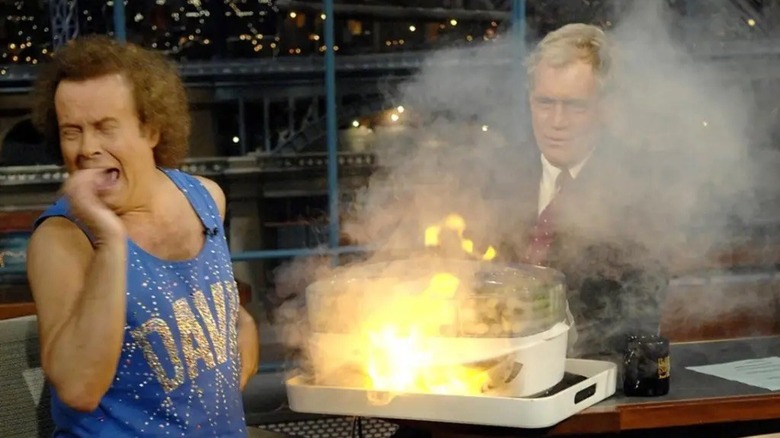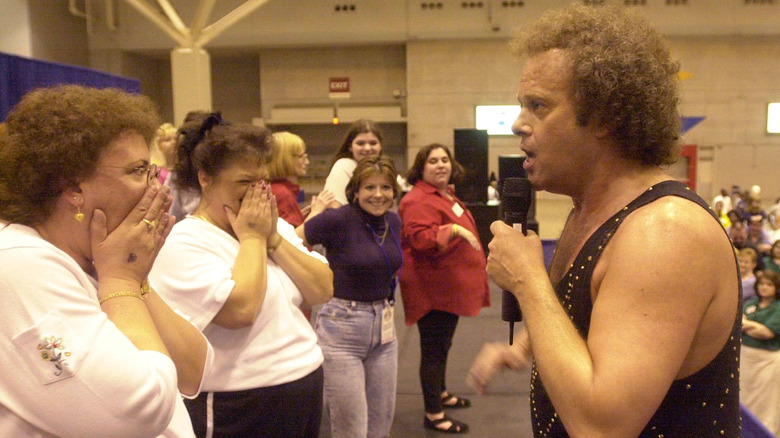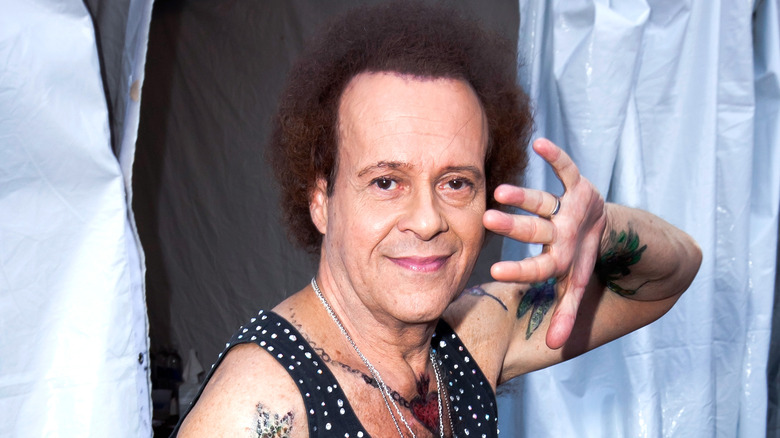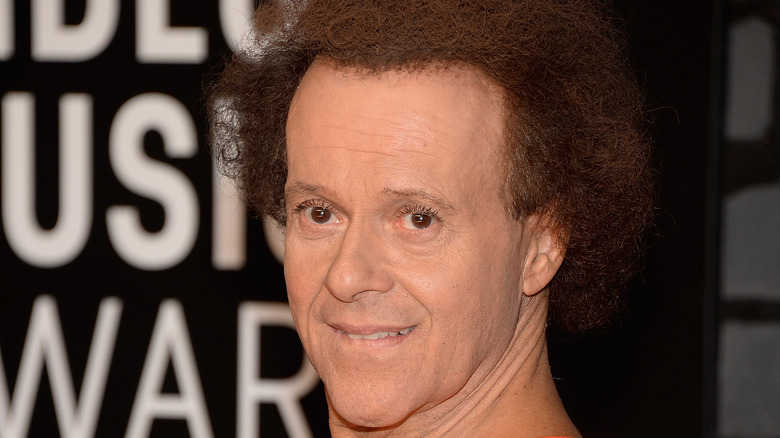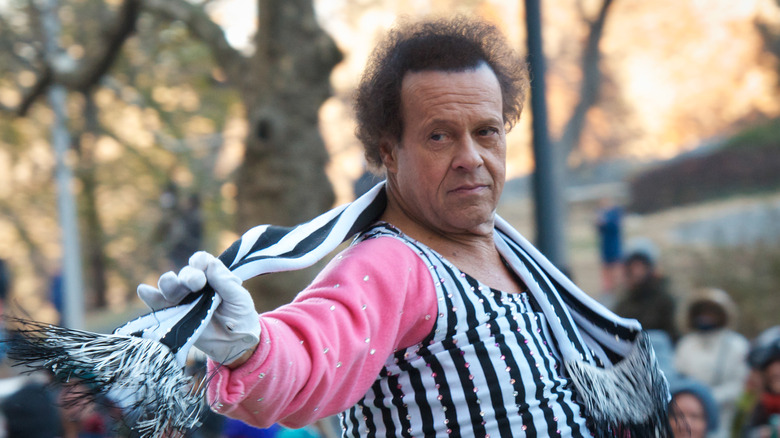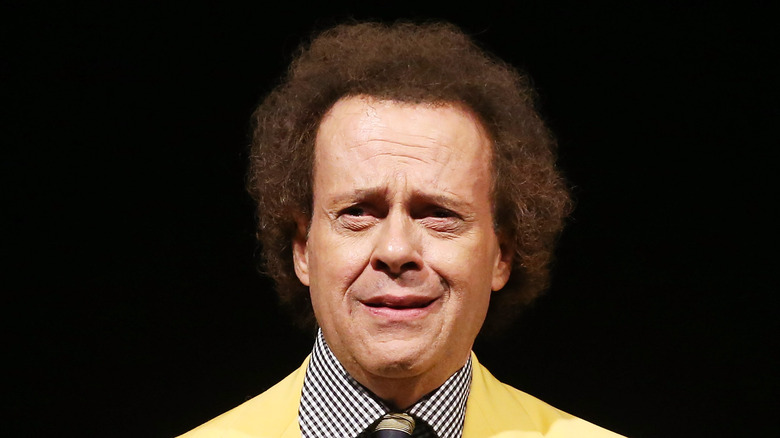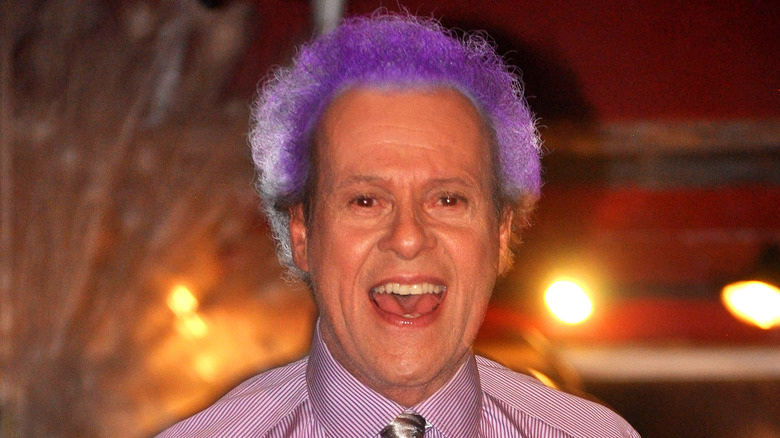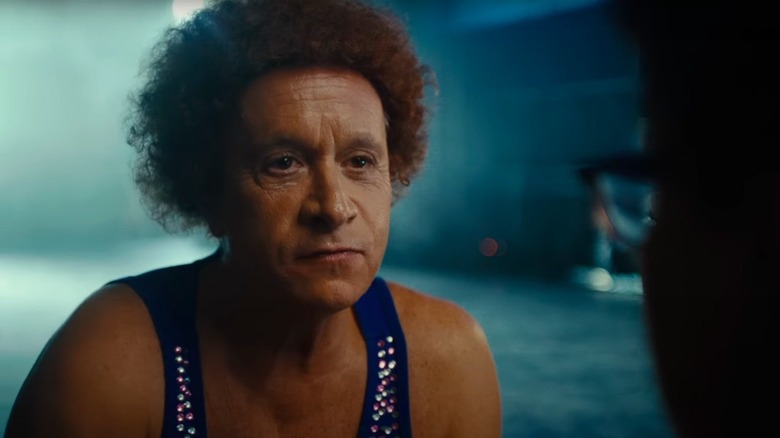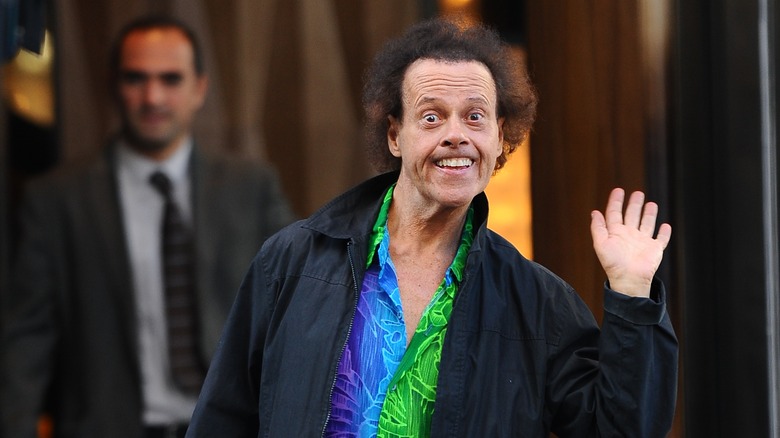The Stunning Transformation Of Richard Simmons From Ubiquitous Fitness Guru To Mysterious Recluse
Flamboyant, flashy, and fabulous, Richard Simmons has been deeply ingrained within the fabric of American pop culture since the 1980s. His mission has never wavered: to help those struggling to lose weight, leading them on a non-judgmental, inclusive journey to embrace exercise and start making smart dietary choices to take the pounds off — and keep them off.
Simmons spent his youth battling obesity and devised that common-sense regimen after his personal trial-and-error attempts at fad dieting. "For years I threw up after I ate, I starved, I did all kind of silly things," he once said in a television interview. Unlike other fitness icons of his era, Simmons wasn't pushing people to achieve perfection, to look like the Hollywood-approved ideal, but to simply do their best — and to keep loving themselves. "I'm saying everybody should keep trying," Simmons explained. "If there's somebody who's 400 pounds, I want to get them down to 200 pounds." Sure, he made a few bucks along the way doing it, with such ventures as his Deal-a-Meal plan (shilled via infomercial, of course), and umpteen Sweatin' to the Oldies exercise tapes, a routine for all fitness levels that emphasized the joy of getting off the couch and moving one's butt to pop classics.
For decades, Simmons was everywhere, an omnipresent figure in the media landscape — until, suddenly, he wasn't. To find out more, keep reading for a look at the stunning transformation of Richard Simmons from ubiquitous fitness guru to mysterious recluse.
Richard Simmons was an overweight kid growing up in New Orleans
Before he was fitness icon Richard Simmons, he was born Milton Teagle Simmons in New Orleans. Growing up in the Big Easy's historic French Quarter, Simmons was surrounded by some of the finest, richest, and fattiest food in the world. Not surprisingly, the youngster loved to eat. "I came out of my mother's womb with a fork," he joked during an appearance on "The Oprah Winfrey Show."
That love of food resulted in obesity. He weighed 200 pounds in middle school and hovered near 270 at his high school graduation. He was targeted by bullies — which only exacerbated the situation when he tried to dull the pain by finding comfort in food. This, he wrote in his autobiography, "Still Hungry — After All These Years" (via the Chicago Tribune), was how humor became his suit of armor. "In high school, I could get beaten up all the time, or I could be something better. I became the court jester," he explained.
Desperate to lose weight, he went on a diet so restrictive that he developed an eating disorder. At one point, his weight dropped to a dangerously low 119 pounds, losing all his hair (his iconic curly 'do is the result of painful hair transplants). Coming to realize that he'd swapped compulsive eating with compulsive dieting, Simmons knew he wouldn't live long unless he changed his approach to one that embraced regular exercise and a sensible diet.
He opened his fitness center in Los Angeles
Richard Simmons felt he'd discovered the key to helping people like him — those who wanted to lose weight but needed safe and healthy guidance. In his early 20s, he moved to Los Angeles and eventually opened his own Beverly Hills gym called the Anatomy Asylum. The place quickly developed a reputation as the next big thing, where fitness aficionados would sweat alongside the likes of Diana Ross, Barbra Streisand, and Cher. Propelled by his outsized personality, the gym proved to be a big hit and expanded to other parts of the country. Given that the gym's success was inextricably tied to its owner, it wasn't long before Simmons became something of a media fixture while promoting his business.
Simmons later renamed his gym Slimmons. Over the years, as his fame continued to grow, Simmons himself continued to teach classes there whenever he could. The reason, he explained in an interview with The New York Times, was to maintain his connection with the people for whom he opened Slimmons in the first place. "I don't have to teach anymore, I don't have to work anymore, God has been really good to me," Simmons said. "But I can't forget these people — where would they go? Where would these men and women who don't feel accepted in other places, where would they find a place to work out where they could laugh and feel good about themselves?"
National TV fame thanks to General Hospital
In the late 1970s, Richard Simmons began making inroads into television. Initially, this was as a guest on talk shows, his ebullient and hilarious personality making him a natural on the small screen. In 1979, he was hired to play himself on the daytime soap "General Hospital," remaining a regular part of the show for the next few years as a recurring guest star (he returned to the show in 2013, and proved to be as outrageous as ever).
That national TV exposure paved the way for Simmons to land a daytime talk show called "The Richard Simmons Show." Airing for four seasons, from 1980 until 1984, Simmons welcomed celebrity guests to discuss topics related to health and fitness — and also won four Daytime Emmys in the process. In both cases, whether it was appearing on a soap or interviewing stars, Simmons never strayed from his core mission. "I just hope I help some people, that's all," Simmons told the Chicago Tribune.
While Simmons continued visiting talk shows throughout the decades that followed, he also appeared on scripted TV series as well — almost always as himself, which was the case in shows ranging from "CHiPs" to "Fame" to "Arrested Development."
He became a favorite guest of Howard Stern and David Letterman
In the 1980s, Richard Simmons made the first of what would be numerous appearances on Howard Stern's radio show. Simmons often appeared in costume, such as the time he dressed as a nurse or a macho guy with a fake mustache. Stern certainly pushed the envelope when it came to good taste; on Stern's TV show, the radio host once used food to tempt some of the guests whom Simmons had brought along to tell their weight-loss success stories, dangling a bag of potato chips and a roast chicken in front of them, hanging from a pole. According to Stern, he and Simmons were friendly off the air, and he even invited Simmons to his home — but just once, his outrageous antics (such as throwing food into the swimming pool) ensured he wasn't invited back. "He was always on all the time," Stern observed of Simmons.
Simmons was also a favorite of late-night legend David Letterman. Those appearances, though, occasionally featured Letterman pulling pranks on him, such as rigging one of Simmons' steamers to explode and even blasting him with a fire extinguisher.
In March 2024, after Simmons had long vanished from the public eye, Stern shared his desire to have him back on his show — but without their usual shtick. "I would like to do a serious interview with Richard Simmons and get to the bottom of all this stuff," Stern said.
He established a deep connection with people trying to lose weight
While most of the world witnessed Richard Simmons' wacky side, those who leaned on him to help them lose weight experienced his extreme empathy. As a 2009 ABC News profile pointed out, he typically started each morning by telephoning people struggling with obesity in order to offer his continued encouragement. "I call them to check up on them," Simmons divulged. "I call them to tell them how beautiful they are. I tell them they are successful and they're worth it. I tell them about having more self-respect. I sing to them."
As Simmons told the Pocono Record in a 2002 interview, he typically spoke to between 50 to 80 people each day, offering his unwavering advice (drink more water, eat more vegetables, get some exercise, etc.). He would also write to them, and these were far from celebrity fan club form letters. "I write to them all personally," he said, estimating that he'd written to "thousands and thousands" of people by that point. "Real letters," he elaborated. "One letter at a time."
He also detailed what it was about the approach that differentiated him from those whose diet books regularly topped the bestseller lists, only to be supplanted by the next big fad diet. "They make the money and leave," Simmons explained. "I already made my money so I can stay."
He suddenly vanished from the public eye
As a public figure, Richard Simmons had seemingly been everywhere. In 2013, he appeared on MSNBC's "The Big Idea," attended the MTV Video Music Awards, dropped by Howard Stern's radio show (and left in tears when Stern described him as "womanly"), and sat down with Fox News' Neil Cavuto. In January 2014, he attended a charity event, and the following month shared a video on YouTube in which he led a fitness class. That was the last time he was seen in public.
Later that year, TMZ reported that it had been months since he'd last been seen at Slimmons, where he'd typically been a ubiquitous presence. A source told the outlet that Simmons had sunk into a deep depression due to a chronic knee injury, which would require knee replacement surgery.
Others, however, shared their fears that there was something far more dire afoot. As rumors began to swirl, Simmons' spokesperson Thomas Estey insisted that he was fine. "The truth is very simple, he has a knee injury, and it's serious enough to keep him from doing what he loves most: exercising and motivating others," Estey told the New York Daily News. "He is not clinically depressed or a shut-in or a recluse." That explanation, however, didn't placate Simmons' friends, who complained that he'd cut off contact — with one telling TMZ they were extremely worried about him after not hearing anything from him for months.
Rumors he was being held hostage by his maid
One juicy rumor that began making the rounds — even reported in outlets such as the Daily Mail — claimed that Richard Simmons' housekeeper, Teresa Reveles, had been keeping him hostage in his own home. According to that particular allegation, spread by Simmons' former personal assistant, Mauro Oliveira, Reveles was preying on Simmons, whose weakened physical and mental state provided her the opportunity to take control of his life and his finances.
Simmons shot that down when he phoned into the "Today" show, insisting to the show's then-anchor Savannah Guthrie that he was just fine. "No one is holding me in my house as a hostage," he said, refuting the "very silly" accusations. "She's been with me for 30 years," he said of Reveles. "It's almost like we're a married couple."
As if hearing it from the proverbial horse's mouth wasn't enough, police investigated the situation by paying a visit to Simmons' home to perform a welfare check after one of his alleged former friends reported that Simmons was the victim of elder abuse. As TMZ reported, police conducted separate interviews with both Simmons and Reveles. They were satisfied that there was nothing shady taking place, and that Simmons was indeed in charge of his own affairs.
He sued a tabloid over transitioning claim
During Richard Simmons' absence from the public eye, rumors began filling the void. In the wake of the claims about his housekeeper, the National Enquirer upped the ante with a cover story claiming that Simmons had transitioned to female, and was now known as Fiona. Simmons denied that claim, with his rep telling TMZ the story was "absolute madness and not true."
Simmons was so incensed by the story that he instructed his lawyers to launch a defamation lawsuit against the Enquirer's parent company, American Media. "This case is about a particularly egregious and hurtful campaign of defamations and privacy invasions, falsely asserting that Mr. Simmons is transitioning from a male to a female, including 'shocking sex surgery,' breast implants, hormone treatments and consultations on medical castration," Simmons' suit declared, as reported by People. According to Simmons' attorney Neville L. Johnson, the reclusive fitness icon had simply had enough. "He has denied [the stories] consistently, and they are relentless," he told People of Simmons' decision to sue. "I think he reached a point where he just said, 'This is unacceptable.'"
When the case went to trial, it did not go in the direction that Simmons had expected. As SFGate reported, the judge presiding over the case determined that misidentifying someone as transgender does not constitute defamation. As a result, Simmons' suit was dismissed, and he was ordered to pay American Media's legal costs. He later appealed, but then dropped it.
His mysterious seclusion spawned a hit podcast
Simmons' transformation from constant media presence to full-on recluse continued to fascinate the public. That was evident with the launch of the "Missing Richard Simmons" podcast in February 2017. The podcast was created by Dan Taberski, a former producer on "The Daily Show" who'd also been a regular participant in exercise classes at Slimmons and considered himself one of Simmons' friends. "At first I didn't realize he had disappeared from everybody, I thought he had just disappeared from me," Taberski explained to The Hollywood Reporter. "It turned out to be a much bigger mystery than I thought it was and so I embarked on this process to try and find him."
According to Taberski, he did a deep dive into the enigma of Simmons' disappearance and interviewed more than 100 people — including Simmons' brother in New Orleans, his only living relative.
While "Missing Richard Simmons" raised multiple questions and became popular with listeners, it also generated controversy about whether Taberski was invading the privacy of someone who no longer wanted to be a public figure. As The New York Times so succinctly put it, "As Mr. Taberski digs deeper into Mr. Simmons's personal life, the question becomes not 'What happened to Richard Simmons?' but 'Is it any of our business?'"
He sued a private investigator who was tracking him
The National Enquirer wasn't the only entity to feel the wrath of Richard Simmons' lawyers after his retreat from public life. In 2018, he sued Scott Brian Mathews, a private investigator whom Simmons alleged had affixed a tracking device to his housekeeper's car to keep tabs on his whereabouts. In Simmons' lawsuit, reported People, he stated his belief that the tracking device had been in use for at least 18 months.
"As a result of discovering that Mr. Mathews was tracking his whereabouts by placing a tracker on Ms. Reveles' vehicle, Mr. Simmons and Ms. Reveles have suffered significant mental anguish, including, without limitation, anxiety, feelings of powerlessness, frustration, and humiliation in discovering that they were being tracked, and their privacy invaded," the lawsuit declared.
Simmons later amended his complaint to include Bauer Media Group, publisher of In Touch Weekly, claiming that Mathews had been working for the supermarket tabloid. That led the PI to be hit with criminal charges for illegally spying on Simmons. A judge denied Bauer Media Group's attempt to get the lawsuit thrown out.
Pauly Shore announced plans to play Richard Simmons in a biopic
The longer that Richard Simmons has remained out of the spotlight, the greater the public fascination about him. That was evident in September 2023, a decade after his retreat from public life, when comedian Pauly Shore took to Instagram to comment on a viral meme making its way through the internet, which pointed out his resemblance to Simmons. Shore then announced his aspiration to portray Richard Simmons in a biopic, and that he'd been attempting to reach out to Simmons about the project.
To illustrate why he was perfect for the role, the "Encino Man" star unveiled a short film he'd produced, titled "The Court Jester," at the Sundance Film Festival. In the 10-minute presentation, Shore played Simmons, behind the scenes during an appearance on "The Ellen DeGeneres Show."
When the film was officially announced, Simmons briefly re-emerged via social media to distance himself from the project. He reminded everyone that he had nothing to do with the biopic, and hadn't authorized it. "Hi Everybody! You may have heard they may be doing a movie about me with Pauly Shore. I have never given my permission for this movie. So don't believe everything you read," Simmon wrote in a Facebook post. "I no longer have a manager, and I no longer have a publicist. I just try to live a quiet life and be peaceful. Thank you for all your love and support."
Social media posts about dying and cancer caused confusion
While Richard Simmons has been keeping a low profile for the past decade, he's still maintained his connection with fans through social media. One of his regular missives, however, stirred up a whole lot of confusion. "I have some news to tell you. Please don't be sad. I am ... dying," he wrote in a March 2024 Facebook post. Media reports on Simmons' alleged health issues focused on that latter sentence and not the actual gist of his message, which he explained in a follow-up post. "I am not dying," he clarified. "It was a message about saying how we should embrace every day that we have."
He then shared a post revealing that he'd been diagnosed with skin cancer, and had a procedure to remove a small malignant growth under one of his eyes. When that post also resulted in concerned fans and news reports, he issued yet another follow-up; this time, Simmons revealed that his skin cancer diagnosis had taken place many years earlier, and wasn't something that anyone should be concerned about. "I guess I should be more careful about what I write about," he conceded.

